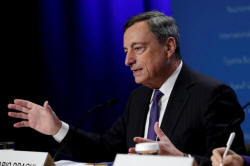ECB curbs bond-buying in first step towards end of easy
money
 Send a link to a friend
Send a link to a friend
 [October 26, 2017]
By Balazs Koranyi and Francesco Canepa [October 26, 2017]
By Balazs Koranyi and Francesco Canepa
FRANKFURT (Reuters) - The European Central
Bank, taking its biggest step yet in weaning the euro zone economy off
years of stimulus, announced on Thursday it was cutting back on its
lavish monthly purchase of euro zone bonds.
Hedging its bets, however, it also extended the bond-buying program's
lifespan.
The bank cut bond buys in half to 30 billion euros a month, taking
comfort in an economic recovery now in its fifth year and moving in sync
with peers like the U.S. Federal Reserve and the Bank of England, as
they also prepare to tighten policy.
Yet, the ECB remains bothered by low inflation, so it twinned the cut
with a nine month extension of the program, opting to buy fewer bonds
but for a longer period to reassure investors it will provide
accommodation for a long time.

Indeed, the ECB even maintained its option to increase or extend the
bond buying program, an apparent victory for policy doves who argued
that they should not commit to ending the buys since possible euro gains
could exacerbate weak inflation.
Designed nearly three years ago to fight off the threat of deflation,
the bond purchase scheme has cut funding costs, revived borrowing and
lifted growth, even if it ultimately failed to raise inflation back to
the ECB's target of almost 2 percent.
"If the outlook becomes less favorably, or if financial conditions
become inconsistent with further progress towards a sustained adjustment
in the path of inflation, the Governing Council stands ready to increase
the asset purchase program in terms of size and/or duration," the ECB
said in a statement.
The ECB added that its main refinancing operations and the three-month
longer-term refinancing operations will continue to be conducted as
fixed rate tender procedures with full allotment for as long as
necessary, and at least until the end of the last reserve maintenance
period of 2019.
Interest rates were left unchanged as expected and the ECB reaffirmed
its guidance to keep them unchanged until well after its bond buys end.
Analysts ahead of the meeting expected the bond purchases extended by
six months at 40 billion euros per month while sources close to the
discussion said that the internal debate was focusing on a nine month
extension with volumes cut to somewhere between 25 billion and 40
billion euros.

Attention now turns to ECB President Mario Draghi's 1230 GMT news
conference, where he is likely provide further clues about the bank's
policy shift.
[to top of second column] |

European Central Bank (ECB) President Mario Draghi speaks at a news
conference during the IMF/World Bank annual meetings in Washington,
U.S., October 14, 2017. REUTERS/Yuri Gripas/File Photo

DEBATE
Hawks such as Germany and the Netherlands wanted a commitment to end bond buys
arguing that growth is now above trend and that more purchases do next to
nothing for inflation. Doves on the bloc's periphery meanwhile warned that a
rapid exit could tighten financial conditions, undoing years of work.
The broader outlook is as good as it has been since before the global financial
crisis. An unbroken growth streak has created seven million jobs and the
expansion is now self-sustaining, driven by domestic consumption.
Banks are better capitalized, lending is growing, and divergence between the
core and the periphery, the biggest failure of the currency project, appears to
have halted.
Inflation, however, is expected to miss the ECB's target of almost 2 percent at
least through the decade as labor market slack remains large, keeping a lid on
wages and supporting the case for continued support.
The ECB is also slowly running out of bonds to buy in some countries, suggesting
that market constraints will play an increasingly large role in the policy
debate as a major redesign of rules risked sending the wrong signal when the
bank is working on an exit strategy.

While a nine-month extension at a reduced pace was seen as viable under current
rules, another extension could require more creativity as the ECB would be
running low on German bonds to buy, a hurdle since purchase need to match the so
called capital key, each country's relative size in the euro zone.
To pave the way for the eventual end of bond buys, Draghi is expected to
increase the emphasis on conventional tools, such as interest rates, which are
not seen rising until 2019, at the earliest.
He is also seen focusing more on reinvestments from maturing debt and the
support provided by its oversized balance sheet, shifting communication away
from flows.
It could also take some pressure off government bond purchases by increasing the
share of corporate and covered bond buys in the scheme, funneling a bigger share
of its cash to the private sector rather than government bond markets.
(Reporting by Balazs Koranyi and Francesco Canepa Editing by Jeremy Gaunt)
[© 2017 Thomson Reuters. All rights
reserved.] Copyright 2017 Reuters. All rights reserved. This material may not be published,
broadcast, rewritten or redistributed. |